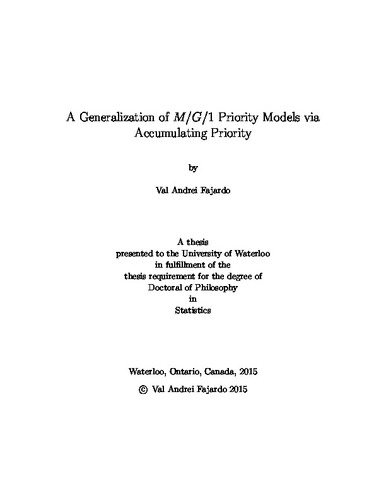| dc.description.abstract | Priority queueing systems are oftentimes set up so that arriving customers are placed into one of $N$ distinct priority classes. Moreover, to determine the order of service, each customer (upon arriving to the system) is assigned a priority level that is unique to the class to which it belongs. In static priority queues, the priority level of a class-$k$ ($k=1,2,\ldots,N$) customer is assumed to be constant with respect to time. This simple prioritization structure is easy to implement in practice, and as such, various types of static priority queues have been analyzed and subsequently applied to real-life queueing systems. However, the assumption of constant priority levels for the customers may not always be appropriate. Furthermore, static priority queues can often display poor system performance as their design does not provide systems managers the means to balance the classical trade-off inherent in all priority queues, that is: reducing wait times of higher priority customers consequently increases the wait times for those of lower priority.
An alternative to static priority queues are accumulating priority queues, where the priority level of a class-$k$ customer is assumed to accumulate linearly at rate $b_k>0$ throughout the class-$k$ customer's time in the system. The main benefit of accumulating priority queues is the ability, through the specification of the accumulating priority rates $\{b_k\}_{k=1}^N$, to control the waiting times of each class. In the past, due to the complex nature of the accumulating prioritization structure, the control of waiting times in accumulating priority queues was limited --- being administered only through their first moments. Nowadays, with the advent of a very useful tool called the maximal priority process, it is possible to characterize the waiting time distributions of several types of accumulating priority queues.
In this thesis, we incorporate the concept of accumulating priority to several previously analyzed static priority queues, and use the maximal priority process to establish the corresponding steady-state waiting time distributions. In addition, since static priority queues may be captured from accumulating priority queues, useful comparisons between the considered accumulating priority queues and their static priority counterparts are made throughout this thesis. Thus, in the end, this thesis results in a set of extensive analyses on these highly flexible accumulating priority queueing models that provide a better understanding of their overall behaviour, as well as exemplify their many advantages over their static priority equivalents. | en |

